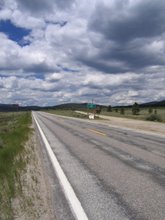What is it that we do here each week, when we share communion—the Lord’s Supper—together?
Communion is a ritual filled with many layers of meaning, with a rich history, and a bit of disagreement, and many different—yet good—interpretations. The sharing of bread and wine is one of our oldest Christian rituals, mentioned in Paul’s letters, the earliest portion of the New Testament, and in the book of Acts, the story of the early church.
Communion is a sign of the coming of the Realm of God, which sounds so heavy, but is so accessible.
Again: Communion is a sign of the coming of the Realm of God, or the kingdom of God
The Realm of God, Jesus said, is like a wedding banquet to which we are all invited. And it’s so important that we all be there, that a shepherd would leave his whole flock to find just one missing sheep.
We see the realm of God in the other meals that Jesus ate in his lifetime—meals with sinners, tax collectors, the outcasts, the poor, the marginalized. Throughout Jesus’ life, this open table was one of his most characteristic and controversial practices. It was carried through in the early Christian church, where the Jews and the Greeks, the rich and the poor, slave and free, male and female broke bread and worshipped together, sharing actual meals, “love feasts,” the ancient coffee hour.
These meals recall that ancient promise of the prophet Isaiah, who said that on the mountain, God will make for all peoples a feast of rich food, of well aged wine, and wipe away the tears from all faces. God invites all to the feast, and we are to turn no one away.
This is what we –not just symbolize—but actually act out, when we share communion: that we are all invited to God’s table—coming from east, and west, north and south— that we are all invited to a common life, together, ordered by justice, love, and peace. In a world marked by war, the church is called to be an outpost of the realm of God on earth, to build it and to share it. And of course, our life and the church’s life is messy. But this ritual, this sacrament is a sign of that hope which we have, that “God’s kingdom will come”, that someday all the earth will be fed, will be at peace, will be whole.
It is appropriate that in our communion, as we act out the practice that makes us followers of Christ, we also remember and give thanks for all that God has done and is doing. And we remember this tangible life of Jesus, a flesh and blood person who lived among us and showed us how we could be, how could live. We remember Jesus, and we remember what it cost Jesus to do this—his life, his body, his blood. Communion memorializes that sacrifice, but also points towards victory.
For death was not the end— afterwards, Jesus appeared to the disciples on the road to Emmaus: they did not recognize Jesus but saw him as a stranger, until later when they invited him to stay for dinner, and then Jesus took the bread, blessed and broke it, and their eyes were opened, and they recognized Jesus for who we was.
I pray that when we share the glorious open feast of communion, that we may draw closer to God, that we may see Jesus in our midst, that we might be encouraged and strengthened to go out into the world and live the life to which we’ve been called.
Friday, July 24, 2009
Subscribe to:
Post Comments (Atom)

No comments:
Post a Comment